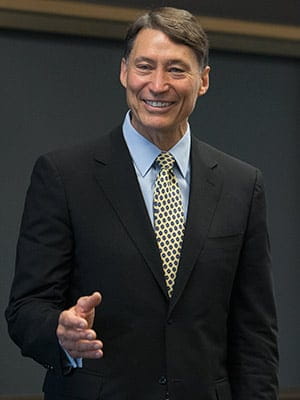
Thought Leadership
The Three Dimensions of Executive Success
By Fred HarburgOf the many skills required to serve effectively at the highest levels, none is more important than judgment. The judgment required to lead effectively and to act thoughtfully, beyond instinctual reactions, is a uniquely human capability. Neuroscientists call this competence, “executive function.” Executive function is your ability to think about what you think about, and to have awareness of your own awareness. While other animals may have a primitive form of this capability, scientists agree that humans have it in significantly greater quantity and quality than any other animal. If there is one thing that makes you uniquely human, this is it.
Executive function provides the basis for judgment of all types (moral, financial, business, social, physical, etc.). It provides the foundation for personal resilience, all types of planning and performance, and ultimately shapes the results you attain in challenging and changing environments. The more of this competence you have, the better. People with excellent judgment and executive function skills consistently get things done on time and produce excellent results. People lacking good executive functioning skills do not.
Healthy executive function and good judgment are so closely intertwined that they are essentially synonymous. Judgment capabilities go far beyond the executive ranks — children begin developing these skills soon after birth and continue to do so throughout life. The remarkable news regarding judgment is that it is never too late to strengthen it. Thousands of people have done so, and with deliberate practice, you can do the same.
What? So what? Now what?
Research demonstrates that judgment can be best understood by viewing its three main dimensions: perception, synthesis, and action. When considered together, these three dimensions form a process chain, each step of which is defined by a set of questions we can frame as: What? So What? Now what?
When an executive is exercising perception, the questions are, “What is happening, what is accurate, and what is a desirable outcome of action in this situation?” During synthesis the questions become, “So what are the key insights of your perceptions, and so what are the implications for action?” During the final dimension the question moves to, “Now what must you do to stay on track and avoid the traps that might derail you as you take action to reach your goals?
The process for strengthening judgment is simple, but not easy. The first step is to identify, challenge, and change the narrative scripts that degrade good judgment. For example, impulsive actions are often driven by exaggerated catastrophe scripts. Challenging and changing exaggerated disaster scenarios is essential. The second step in strengthening judgment is to form deliberate practices that move scripts to action. In the case of impulsivity, taking a moment to verify probable consequences is the kind of practice that can move decisions from reckless to thoughtful.
While it can be challenging to redirect narrative scripts and to cultivate deliberate practices that strengthen judgment, it is well worth the effort. As Euripides, the ancient Greek philosopher said, “Fortune truly helps those who are of good judgment.”
 |
Fred Harburg is the Executive Director of the Kellogg Executive Leadership Institute (KELI) and a Clinical Professor of Executive Education at the Kellogg School of Management. Previously, he served as the Chief Learning Officer and President of Motorola University, was the Senior Vice President for Leadership and Learning at Fidelity Investments and was Chief Learning Officer at Williams Energy. He began his career as an officer and pilot in the US Air Force. Fred is passionate about executive coaching and equipping executives with the tools to accelerate organizational transformation, bolster productive learning cultures and develop effective leaders. |
Download a Brochure >
Spaces are limited. Register today.



